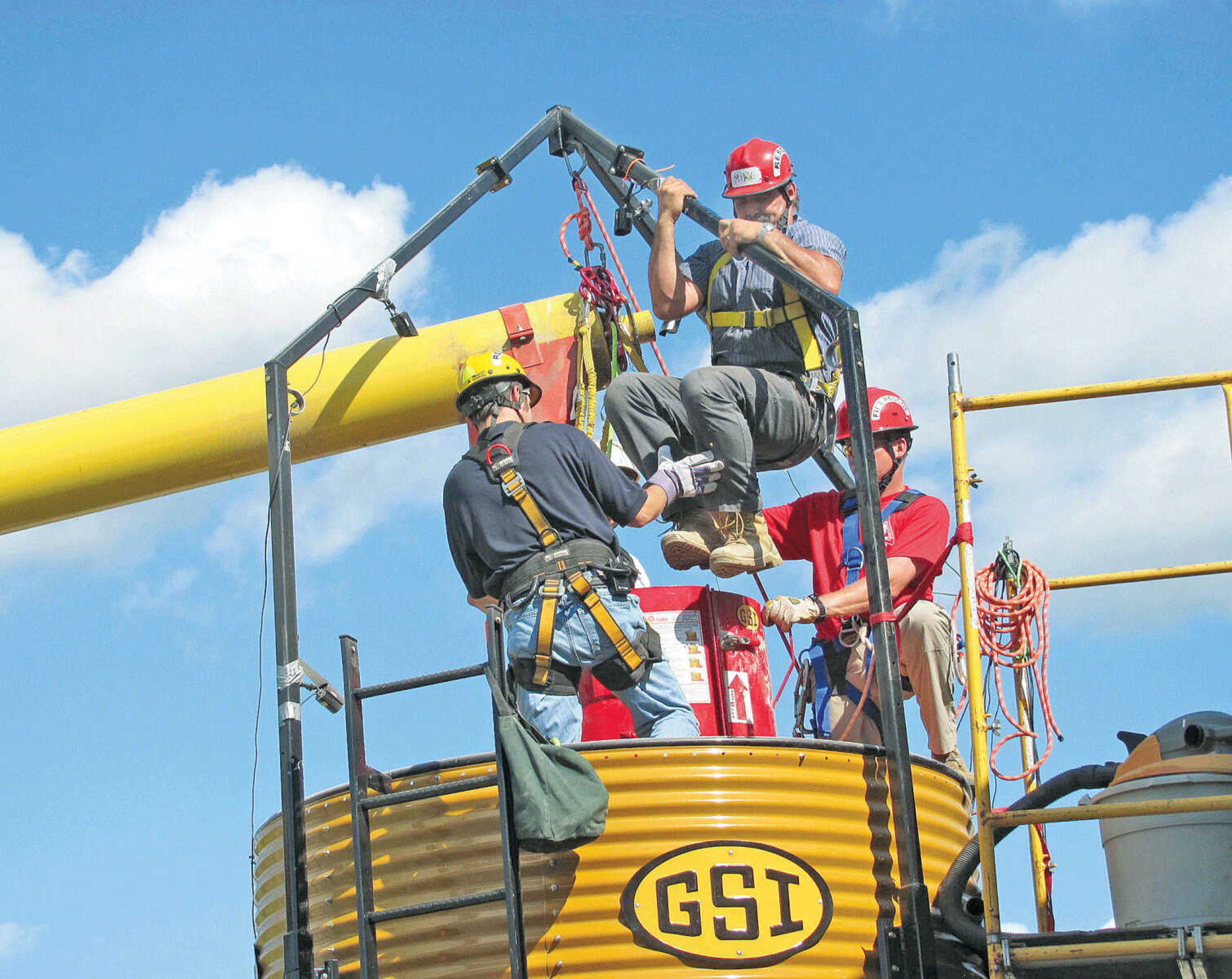Farmers learn safety techniques at Scott City seminar
When it comes to working in and around grain bins, it may only take five minutes to be safe, but it can take a lifetime to get over someone's death. That's the message Pam Dowdy of Bloomfield, Mo., whose husband, David, died in a grain bin entrapment 11 months ago, shared with attendees at a grain bin safety seminar Tuesday at Macke Equipment in Scott City.
When it comes to working in and around grain bins, it may only take five minutes to be safe, but it can take a lifetime to get over someone's death.
That's the message Pam Dowdy of Bloomfield, Mo., whose husband, David, died in a grain bin entrapment 11 months ago, shared with attendees at a grain bin safety seminar Tuesday at Macke Equipment in Scott City.
About 80 farmers, rescue personnel and others involved in agriculture attended the presentation and a simulation on how to free a trapped person.
Owner Dan Beussink said he asked Grain Systems Incorporated's Safety and Technical Rescue Association to give a seminar for his customers and other community members due to an increase of accidents involving grain bins in the area, including two deaths.
"I think a lot of times, people don't realize just how quick you can get in trouble in a grain bin," Beussink said.
Instructor George Lovell with the Safety and Technical Rescue Association agreed. He shared his No. 1 piece of advice for those working in and around grain bins.
"Always be aware of your surroundings," he said. "It just takes one slip and you can become a statistic."
For those who witness someone getting caught in a grain bin, Lovell said the most important thing to do is keep from becoming part of the problem.
"Don't run in," he said. "Call for help first. Starting the process with 911 is crucial."
Lovell shared several preventive measures and rescue techniques.
One of the most well-known preventive techniques is called "lock out/tag out," he said.
"Lock all of the power off and put up a tag saying there is an individual inside," he said.
Working with others and having a safety plan in place can also prevent accidents.
Dowdy said with some of those precautions, her husband would likely still be alive.
The morning of his death, Dowdy said they had talked about his plans for the day, when he planned to empty out an 18,000-bushel bin. As it was "crusted" on the top, Dowdy said she urged her husband to be extra-careful.
"He said 'I've got the harnesses and the ropes, me and the boys will be OK,'" she recalled.
But that wasn't the case.
"After 41 years of marriage, I lost my husband and my best friend, simply because the harnesses were left in the back of the truck and he couldn't wait five minutes (until our son and the help arrived)," she said. "The last memory my son has of his dad is of him slipping out of his hands."
Dowdy said that, when she heard the seminar, she called Beussink to ask if he would like her to speak about her family's experience. "I figured I could be a face to the tragedy," she said. "My family and I have pledged that any time we can tell (my husband's) story and it stops one person in their tracks, that it will be worth whatever we go through. I'd like to urge you and encourage you, stop and think before you get in that bin."
Von Priggel, a farmer in the Oran area who attended the seminar, admitted he hasn't always taken all the necessary precautions. "I learned I need to slow down, take time and put safety first," he said. While Priggel doesn't typically attend meetings such as these, he said he felt it was necessary to attend Tuesday's, with recent grain bin entrapments and deaths.
"Today, I learned how easy it is to get trapped," he said.
Priggel said the seminar not only made him more aware, it also taught him rescue techniques he can implement should it be necessary.
Also in attendance were members of the Morehouse Fire Department, including Chief Dale Graham. He said members came to learn since they have several farming operations in their area, as well as Buchheit's new grain bin facilities.
"This is an asset we can bring back to our department," he said. In addition to knowing how to be of assistance, Graham said the department is looking into receiving training for rescues.
As rescue equipment and training is costly, Lovell encouraged those in attendance to take what they learn back to their communities and come up with a way to raise funds for rescue equipment and have people trained to free anyone who may be trapped.
In 2008, the Sikeston Rescue Squad received an $8,000 grant for grain bin rescue equipment and training. "And it is available to the regional Homeland Security team anywhere in Southeast Missouri that it's needed," noted Capt. Ken Dicus. He added that Dexter and Mississippi County received similar equipment.
Dicus said the Rescue Squad has hosted training for fire and rescue personnel around the area, and about 30 people are certified to handle the equipment.
Connect with the Southeast Missourian Newsroom:
For corrections to this story or other insights for the editor, click here. To submit a letter to the editor, click here. To learn about the Southeast Missourian’s AI Policy, click here.










